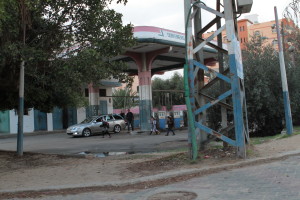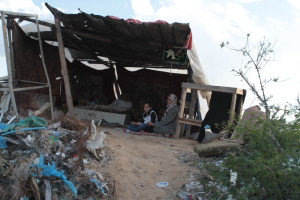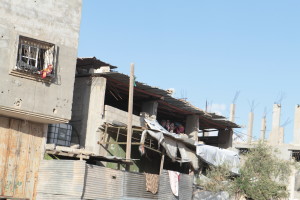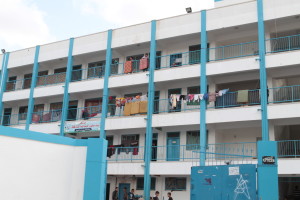Day two in Gaza: Teaching, operating, delivering gifts, by Gerri Haynes
(Washington Physicians for Social Responsibility has traveled to Gaza since 1993. Since 2009, following the Cast Lead invasion by Israel, WPSR has sponsored eight medical delegations to serve the besieged, imprisoned and war-torn people of Gaza.)
This morning, all of the physicians in our group worked at Shifa Hospital. Grant O’Keefe is in general and trauma surgery, Don Mellman and Ralph Rydell saw patients and observed surgeries in their neurosurgery specialty area, and Bill Dienst and Bob Haynes taught Advanced Cardiac Life Support. Maxine Fookson, pediatric nurse practitioner, lectured to nursing students and John Van Eenwyk, psychologist, lectured and consulted with the staff of Gaza Community Mental Health Programme (GCMHP).
Ned Rosch and I delivered suitcases full of medicines to GCMHP. The medicines, funded by donations from Iowa and Washington state, were joyfully received. Many of these medicines were out of stock in the GCMHP pharmacy and are needed for the care of traumatized, war-affected Gazans.
Ned and I were then given a tour of children’s facilities in Deir Al Balah, an impoverished area in central Gaza. The inspiring work being done by Reem Abu Jaber and her colleagues to help the children of this area is many faceted. A Waqf (Google – this was Reem’s gift) kindergarten founded four years ago is functioning beautifully. Last April, Reem (who was the original director of Qattan Center for the Child in Gaza City), received permission to open an Arts and Cultural Center for Children.
NAWA receives educational support from Waldorf Steiner personnel of Germany and is opening its doors to an increasing number of children. This is a resident area, not a refugee area, and the UN does not serve resident children. On the logo for Nawa, a quote from Edward Said reads, “The Power of Culture rather than the Culture of Power.” NAWA presently functions in a very small space but will soon move to a larger home – thus, increasing its capacity to serve neighborhood children.
Reem’s new project – planned for opening in April 2015 – is the renovation of a 1700-year-old Christian monastery. This centrally located building will be the first library for the children of Deir Al Balah in more than 40 years. Children and friends in the US sent with us books and financial support for Reem’s projects.
This afternoon, members of our group toured Beit Hanoun children’s specialty hospital, which was damaged by Israeli weapons in the war this past summer. The neighborhoods around the hospital were badly damaged in a process known as “mowing the lawn.” Families continue to live in makeshift shelters. Many of these shelters were constructed of cardboard-like material that was damaged by recent heavy rains. Some of the homeless are camping in local UN schools (UNRWA) while students continue to double shift for classes.
The physical and psychological toll of war lives in every resident of Gaza. No one was untouched by the summer’s tragedy. That people are able to carry on with love for one another is humbling.
When night falls, Israeli planes regularly fly above Gaza – emphasizing the precarious nature of the present ceasefire. Nearly everyone we talk with mentions the expectation that war will come again.
This evening, a nurse from Al Aqsa Hospital visited us in the Marna House garden. This gentle and generous young man told stories of members of his own family who died or were desperately injured this summer. His grandmother’s chest was lacerated by a piece of shrapnel and this nurse changed her dressings every day for three weeks, carefully observing for and protecting against the possibility of infection. One of his cousins was blown from her home and is brain damaged. Realizing that his relatives were homeless, he gave up his apartment to 10 family members and now is happily “rebinding connections” with his parents.
During the war, I was in touch with this nurse and know that he worked endless shifts in his hospital and slept rarely. He is truly an inspiring soul.
2 Comments to “Day two in Gaza: Teaching, operating, delivering gifts, by Gerri Haynes”
RSS feed for comments on this post. TrackBack URI




By Veronica Desmond, November 3, 2014 @ 12:50 pm
God bless you and the work you do for these suffering people.
Veronica D
By Bert Sacks, November 3, 2014 @ 4:01 pm
Going to Gaza 9 times in 5 years is certainly the work of angels, helping the angels there who are helping their fellow citizens of Gaza through such desparate times.